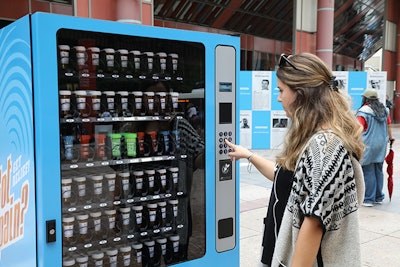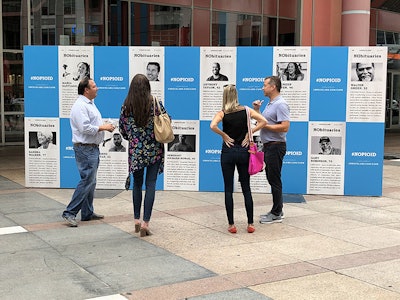
Illinois Gov. Bruce Rauner signed legislation that makes medical marijuana available as an opioid painkiller substitute for qualified patients, dramatically expanding the state’s medical cannabis program, but not without the help and advocacy efforts of Illinois’ cannabis businesses.
While Illinois was ahead of the curve in implementing a modern medical cannabis program when it originally developed its regulations, it has since fallen behind, according to Jeremy Unruh, director of regulatory affairs for PharmaCann, a medical cannabis license holder in Illinois, New York, Ohio, Pennsylvania, Maryland and Massachusetts. “This Opioid Alternative Pilot Program is Illinois catching up to the pack,” he said.
Illinois was one of the only states with legalized medical cannabis that did not grant patients access to the program for general pain indications.
“Sen. Don Harmon, who was the architect of … the Opioid Alternative Pilot Program, really was forward-thinking in developing this,” Unruh said. “He set up this mechanism … [where] any condition for which a physician might prescribe an opioid, that doctor can now make a recommendation for medical cannabis.”
RELATED: PharmaCann Launches Verilife Dispensary Brand, Looks Ahead to New Markets
Studies have shown that states with regulated medical marijuana programs see a reduction in opioid prescriptions and abuse, and Illinois has one of the largest populations in the country, meaning this policy is likely to impact a large number of patients, Unruh added.
The opioid replacement bill also removed the requirement that Illinois’ patients be background checked and fingerprinted before registering in the program. “That law, by getting rid of fingerprinting and background checking, puts Illinois on par with every other state in the country with not fingerprinting and background checking patients,” said Charlie Bachtell, CEO of Cresco Labs, another Illinois-based medical cannabis company with additional licenses in Pennsylvania, Ohio, California, Arizona and Nevada. “We were the only state that required that.”
The legislation also creates a process for patients to get a temporary medical marijuana card while waiting for the state to issue permanent cards, Unruh added. It currently takes up to 100 days for a patient to receive the card once all the paperwork is submitted, he said, but under the new law, patients can take their confirmation or receipt of applying for the card to a dispensary and be immediately inputted to the state’s patient management system and issued a temporary card.
Finally, the bill implements a cannabis tracking system in Illinois to track patients’ dispensing of cannabis, which will allow the state to measure data for public health research, Unruh said.
PharmaCann has lobbyists in each state in which it operates, as well as in Washington, D.C., and the company worked closely with lawmakers on the opioid bill, Unruh said. “We put together an opioid resource guide, where we aggregated as many of the published, peer-reviewed studies on opioid replacement as we could find, and we made sure that the policymakers, particularly Leader Harmon, were aware of that and had that information to help develop his anti-opioid bill.”
And this collaboration with policymakers was not new for PharmaCann, Unruh said. “We work very, very closely with those lobbyists to help ensure that lawmakers—not just supportive lawmakers, but lawmakers from both sides of the aisle and all over the state—understand what it is we’re doing and what it is we’re not doing and what it is that we’re trying to do as we move the cannabis policy ball forward.”
PharmaCann has been very active in Springfield and within its industry association, collaborating with other industry stakeholders to develop a policy position and charging the executive director of the association to execute those positions, he said.
Cresco has a similar mindset. “It’s a very political topic and therefore, as operators, as stewards to the industry, you need to be engaged in that conversation on a political level because if you’re not, somebody else is,” Bachtell said. “Most people who are not active participants in the industry don’t really have a good line of sight on what it means to be a part of this industry. It’s imperative that operators that are in this space collaborate with decision makers and make themselves available and … do whatever it takes to be part of the conversation.”
To kick off International Overdose Awareness week on Aug. 29, Cresco launched its Cresco Labs Opioid Prescription Exchange (COPE) campaign to promote medical marijuana as an alternative to opiates for the treatment of pain. The campaign highlights stories of the positive impact cannabis has had in combating the national opioid epidemic, and launched just after Rauner signed the opioid replacement bill.
“We’ve never had a general pain indication here, and so the idea for us to launch COPE in Illinois was entertaining this Alternative to Opiates Act,” he said. “It was a big opportunity for us to make sure that the people of Illinois first understood that cannabis can be used as an alternative or a supplement to opiates for pain management, and it’s a non-lethal option.”

As part of its COPE campaign, Cresco placed vending machines in high-traffic areas that dispense replica pill bottles with enclosed messages about medical cannabis replacing opioids for pain relief. Photo courtesy of Cresco Labs.
Cresco placed functioning vending machines in high-traffic locations that are filled with replica narcotic pill bottles and labeled with the message, “Got Pain? Get Relief.” Passersby can make a selection on the machine, and a dram labeled “Medical Cannabis” is dispensed with the enclosed message:
WHO SAYS THE EPIDEMIC IS OUR ONLY CHOICE?
When you’re in pain, opioid prescriptions are the norm. Addiction is the norm. Overdose is the norm. That’s just the way it’s been, but we don’t need to accept it. Opioid patients deserve an alternative: medical cannabis.
Ask your doctor about replacing opioids with medical cannabis products and get relief that doesn’t cost you peace of mind. Pain isn’t a choice. How you treat it could be.
The vending machines are accompanied by a wall of “NObituaries,” which are vignettes from people whose lives were changed when they transitioned from prescription opioids to medical marijuana to treat their medical conditions.
“It's an example of Cresco trying to normalize and professionalize the space and maybe try to offer a new perspective for people who aren’t as familiar with cannabis to see how this industry is developing and … normalizing and professionalizing it,” Bachtell said.

Cresco's NObituaries share the stories of people whose lives were changed when they transitioned from prescription opioids to medical cannabis to treat their medical conditions. Photo courtesy of Cresco Labs.
And Cresco has always tried to reach out to industry stakeholders through education- and awareness-based campaigns, he added. “We’re all stakeholders in this industry,” he said. “We’ve always tried to create messaging that was based on awareness and education as opposed to more traditional ‘advertising’-type communications. We prefer to communicate in this awareness and education space because it’s a very valuable message to convey—the type of message that makes the intended audience feel like they know more about the subject matter after they’ve seen our piece, whatever it is.”
Education-based communications can also help dissolve the stigma and stereotypes surrounding cannabis, Bachtell added. “I would say the majority of people when they see our awareness and education campaigns that we’ve launched before, their initial reaction is, ‘Oh, that’s interesting, I didn’t think that was from a cannabis company or that that was related to cannabis,’” he said. “And I think that is probably step one in breaking down preconceived notions or stereotypes when it comes to this subject matter.”
“Our job is in large part to change the way people think about medical cannabis and about cannabis in general,” Unruh agreed. “Public policy is a very, very, very important piece of that function.”
The public policy conversation should demonstrate the industry’s sophistication, compliance and responsibility, Unruh added. “In the statehouse, it’s important for we as an industry to show policymakers what our industry really looks like and what values our industry really has because otherwise, in the absence of that interaction from the industry, they’re left imagining what our dispensaries look like and imagining what our employees do in cultivation centers, and a lot of times, that imagery comes from old legacy markets and old notions of people forking cannabis out of mason jars with chop sticks into little baggies and calling it medicine.”
Looking ahead, Cresco will launch its COPE campaign later this month in Pennsylvania and Ohio. “Both of those states, similar to Illinois, are sort of entrenched in an opiate abuse epidemic, and it’s a great opportunity for this industry to shed a light on the fact that there are alternatives,” Bachtell said. “There’s medical cannabis, and it can be an option for people who are currently using or thinking about using opiates for pain management.”
And as for PharmaCann, Unruh said the company will focus its efforts on Illinois and New York as the states discuss adult-use legalization, as well as on banking issues at the federal level. Unruh recently spent time on Capitol Hill, meeting with staffers of the Illinois and New York Congressional delegation who have responsibility in the banking and financial services sectors.
“Banking is the No. 1 impediment to our industry operating as a normally functioning sector,” he said. “So, it’s very important that we make it clear to particularly conservative policymakers who may not be comfortable with cannabis that we’re not trying to expand cannabis necessarily, … but we’re asking them to fix what’s wrong, to fix the things that are broken, so that our transactions can be auditable and are transparent and can be taxed appropriately.”
Top Image: © G | Adobe Stock


























